Arizona's congressional districts
Arizona is divided into nine congressional districts, each represented by a member of the United States House of Representatives. Since the 2008 elections, Democrats and Republicans have alternated holding a majority of seats in the delegation in six of the last eight elections.
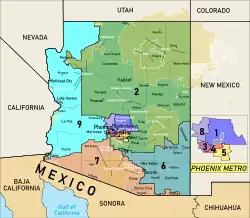
Current districts and representatives
List of members of the United States House delegation from Arizona, district boundaries, and the district political ratings according to the CPVI. The delegation has a total of nine members, with six Republicans and three Democrats.
| Current U.S. representatives from Arizona | |||||
|---|---|---|---|---|---|
| District | Member (Residence)[1] |
Party | Incumbent since | CPVI (2022)[2] |
District map |
| 1st |  David Schweikert (Fountain Hills) |
Republican | January 3, 2011 | R+2 | .svg.png.webp) |
| 2nd |  Eli Crane (Oro Valley) |
Republican | January 3, 2023 | R+6 | .svg.png.webp) |
| 3rd |  Ruben Gallego (Phoenix) |
Democratic | January 3, 2015 | D+24 | .svg.png.webp) |
| 4th | .jpg.webp) Greg Stanton (Phoenix) |
Democratic | January 3, 2019 | D+2 | .svg.png.webp) |
| 5th |  Andy Biggs (Gilbert) |
Republican | January 3, 2017 | R+11 | .svg.png.webp) |
| 6th | 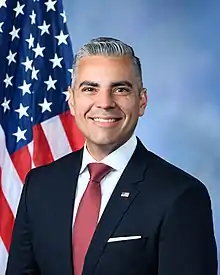 Juan Ciscomani (Tucson) |
Republican | January 3, 2023 | R+3 | .svg.png.webp) |
| 7th | .jpg.webp) Raúl Grijalva (Tucson) |
Democratic | January 3, 2003 | D+15 | .svg.png.webp) |
| 8th | 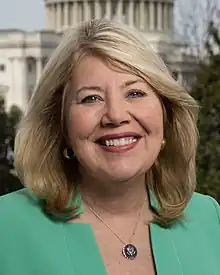 Debbie Lesko (Peoria) |
Republican | May 7, 2018 | R+10 | .svg.png.webp) |
| 9th |  Paul Gosar (Bullhead City) |
Republican | January 3, 2011 | R+16 | .svg.png.webp) |
History
From 1863 to 1912, Arizona Territory sent one non-voting delegate to the House of Representatives. After its statehood in 1912, Arizona was granted one representative in the House. As the state's population has grown, Arizona's delegation has increased in size to its current total of nine representatives.
| Congress | Representatives | Notes |
|---|---|---|
| 38th–62nd (1863–1912) |
1 | Non-voting delegate |
| 62nd–77th (1912–1943) |
1 | |
| 78th–80th (1943–1949) |
2 | Elected on an at-large basis |
| 81st–87th (1949–1963) |
2 | |
| 88th–92nd (1963–1973) |
3 | |
| 93rd–97th (1973–1983) |
4 | |
| 98th–102nd (1983–1993) |
5 | |
| 103rd–107th (1993–2003) |
6 | |
| 108th–112th (2003–2013) |
8 | |
| 113th– (2013–) |
9 |
Historical and present district boundaries
Table of United States congressional district boundary maps in the State of Arizona, presented chronologically.[3] All redistricting events that took place in Arizona between 1973 and 2013 are shown.
| Year | Statewide map | Phoenix highlight |
|---|---|---|
| 1973–1982 | 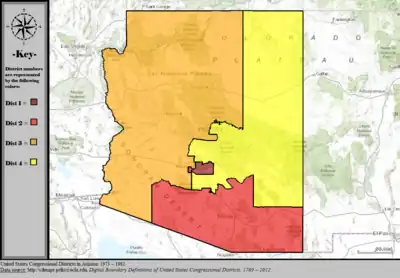 |
%252C_1973_%E2%80%93_1982.tif.png.webp) |
| 1983–1992 | 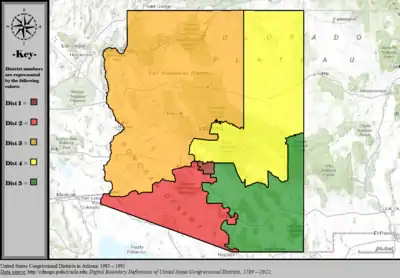 |
%252C_1983_%E2%80%93_1992.tif.png.webp) |
| 1993–2002 | 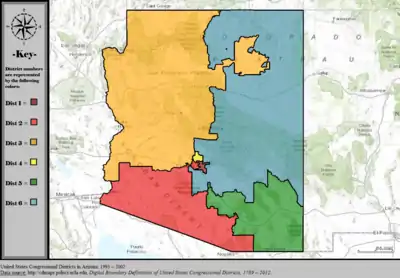 |
%252C_1993_%E2%80%93_2002.tif.png.webp) |
| 2003–2013 | 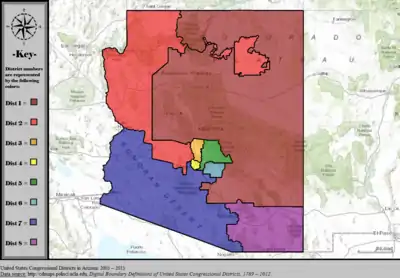 |
%252C_2003_%E2%80%93_2013.tif.png.webp) |
| 2013-2023 | 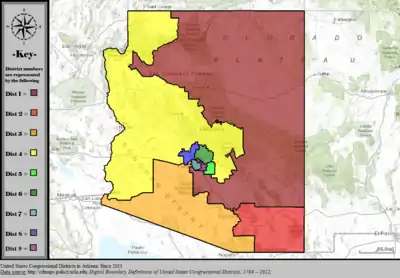 |
%252C_since_2013.tif.png.webp) |
Obsolete districts
Notes
Due to redistricting, the congressional district numbers in Arizona have changed for the 2022 election cycle. Through this process, the district numbers have changed the following ways:
- Arizona's 1st congressional district became Arizona's 2nd congressional district
- Arizona's 2nd congressional district became Arizona's 6th congressional district
- Arizona's 3rd congressional district became Arizona's 7th congressional district
- Arizona's 4th congressional district became Arizona's 9th congressional district
- Arizona's 5th congressional district remained Arizona's 5th congressional district
- Arizona's 6th congressional district became Arizona's 1st congressional district
- Arizona's 7th congressional district became Arizona's 3rd congressional district
- Arizona's 8th congressional district remained Arizona's 8th congressional district
- Arizona's 9th congressional district became Arizona's 4th congressional district
See also
References
- "Office of the Clerk, U.S. House of Representatives". clerk.house.gov. Retrieved January 6, 2022.
- "2022 Cook PVI: District Map and List". Cook Political Report. Retrieved January 5, 2023.
- "Digital Boundary Definitions of United States Congressional Districts, 1789–2012". Retrieved October 18, 2014.
External links
- Rose Institute of State and Local Government, "Arizona: 2010 Redistricting Changes", Redistricting by State, Claremont, CA: Claremont McKenna College